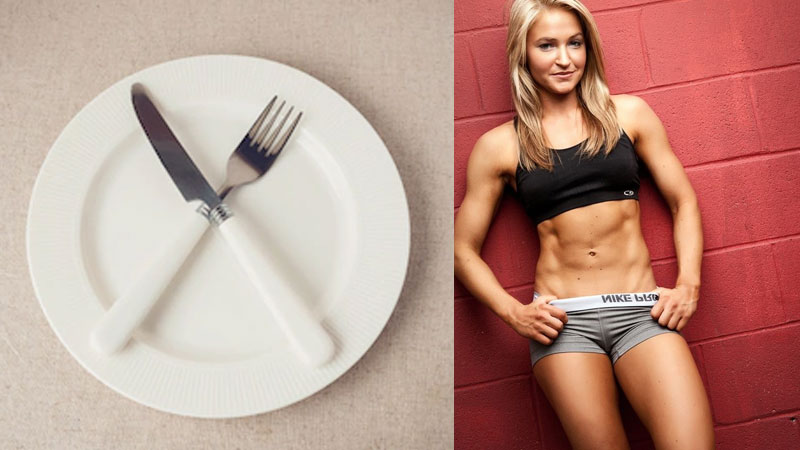
Intermittent Fasting and Fertility in Women
Fasting has become part of the mainstream dietary culture. But what about the effects of intermittent fasting and fertility in women? Could this approach to fat loss actually be harming your hormones?
The change in perception of female physique over the last few years has been mind-blowing. Gone are the waif-like supermodel figures, and in are the strong, dominant and sexy curves of a women that she loves to lift.
But as the quest for a leaner body takes hold, many women turn to harsh diets that risk their health.
Intermittent fasting has become a popular way of achieving a calorie deficit with many females. But has it got a dark side that could affect your health in the long term?
We take a look…
What Is Intermittent Fasting?
Intermittent fasting is a way of dieting that cycles periods of eating of fasting. It’s not so much about what you eat or how much, but more about when you eat them.
That doesn’t mean you can eat as much as you want on an IF diet though, just that you have flexibility in eating what you want within a pre-set, calorie-controlled window.
During fasting periods you can’t eat at all. You can drink water and maybe have the odd tea/coffee or two, but no food whatsoever can make its way to your lips.
You can use supplements such as fat burners or other calorie-free products to help speed up the process, but not food-based supplements such as whey or BCAAs.
Some versions on IF do actually allow you to eat during a fast, but calories should be kept to a minimum. However, this approach isn’t as ‘hardcore’ as a total fast.
Different intermittent fasting approaches
There’s no one way to follow an intermittent fasting diet. The beauty of it is that you can shape it to suit your own lifestyle (or hunger needs) and form your own version of the diet that might work for you.
- Fasting by hours – a popular method is the 16/8 diet where you eat within an 8-hour window and fast for 16.
- Fasting by days – the 5/2 diet is more challenging. It sees you partially fasting (no more than 500 kcals per day) for 2 full days, while eating normally for 5.
- Alternate fast – this one is simple. You eat normally for one day, then fast the next.
- Eat-stop-eat – this flexible dietary approach sees you choose to fast for a full 24-hours, twice per week.
- Meal skipping – this approach is all about skipping meals every now and then to reach an energy deficit.
Most people already follow some kind of fasting already. Think about it, if you skip breakfast or ditch your evening meal you’re already going a good few hours without food. That in itself is a type of fast.
[infobox]Intermittent fasting is a way of dieting that splits periods of eating with periods of complete fasting.
[/infobox]Does intermittent fasting speed up fat loss?
The bottom line is that you’ll never lose fat unless you’re in a calorie deficit.
If you’re restricting calories because you’re not having as much time to eat them, chances are you’ll lose weight.
But… if you eat so much during your non-fasting window that you still fall into a calorie surplus, you won’t shred excess fat – no matter how long your fast is for.
What does the research say?
There are a small number of studies showing intermittent fasting speeds up weight loss, increases fat oxidation and boosts metabolic health.
But these are few and far between. And most have been on animals and not humans.
According to the International Society of Sports Nutrition’s position statement on diets and body composition…
“The collective body of intermittent caloric restriction research demonstrates no significant advantage over daily caloric restriction for improving body composition”
Without additional assistance from a fat burning supplement, intermittent fasting on the whole doesn’t provide any additional benefit compared to a standard calorie deficit.

Intermittent fasting hasn’t been shown to be any more beneficial for weight loss than a standard calorie-controlled diet.
[/infobox]Female fertility Hormones – Intermittent Fasting and Fertility in women
The biology of female reproduction is staggeringly complex. With so many hormones, enzymes, reactions and rhythms involved, the female menstrual cycle is one of the most frighteningly-interesting aspects of human health.
But much like a concerto of different instruments each playing their own parts, it only takes for one individual instrument to lose its tuning before the whole orchestra fails.
These are the important period hormones:
- Estrogen – the primary female sex hormone that regulates ovulation and produces feminine characteristics (breast growth, soft features, wide hips).
- Progesterone – responsible for thickening your uterus lining during your period and promoting fertility.
- Luteinizing hormone and follicle stimulating hormone – these work together to release an egg for fertilization and trigger estrogen production.
- Testosterone – boosts your libido around the time when you’re at your most fertile.
The hypothalamic-pituitary-gonadal axis and fertility
For the many hormones of the menstrual cycle to work together effectively, there has to be a ‘command system’ to monitor it all.
The HPG axis uses three specific glands to help the team work together for the greater good.
- Hypothalamus – this master gland releases a hormone called GnRH to begin preparing the body for your period
- Pituitary – GnRH arrives at the pituitary gland and stimulates the release of LH and FSH which travel to your sex organs so that they can act directly on your ovaries.
- Ovaries – the release of LH and FSH helps to stimulate the release of an egg from the follicle during ovulation, and prepare the body for fertilization.
The potential effects of intermittent fasting and fertility
The menstrual cycle is a tightly-organized system of hormones, each playing their own part in ovulation and fertility.
When a woman is healthy and her body is glowing with nutritious wellness, her period is regular.
But…
When adequate nutrition isn’t available, the lesser-important aspects of the body begin to suffer:
- Hair and nails become brittle
- Skin gets dull and loses its elasticity
- Bone and muscle loss
- Menstrual cycles become irregular or stop altogether (amenorrhea)
When energy from food is limited your body makes a decision. At the heart of it all, the calories that are available are directed to areas that your body sees as being the most important – circulation, body heat, breathing, digestion.
There’s no point being fertile if you don’t have enough energy to survive. That’s the way your body sees things.
You only need to look at severe female starvation illnesses such as anorexia nervosa to show what happens when you lower calorie intake for extended periods. When calories are severely restricted, they lose weight and shred body fat…. but at a huge cost to health.
Reports of missed periods and loss of fertility in women using intermittent fasting
There’s a worrying amount of evidence looking at the link between intermittent fasting and fertility.
Some women start an IF diet with hopes of a complete body transformation – fat loss, better health and more confidence But some have reported menstrual disturbances, irregular periods and even short-term loss of fertility.
The HPG is a sensitive system. GnRH, in particular, is easily affected by changes to your environment (severe stress results in loss of menstruation), exercise and diet.
In women, many hormones work in pulses, much like your heartbeat.
There’s some evidence that even a day or two of intermittent fasting can negatively affect hormonal pulsing, which could lead to loss of fertility hormone production.
To date though, the only evidence of this is in a rat study showing intermittent fasting fertility were related and that a lack of eating could lead to ‘nutritional infertility’ due to dysregulation of hormones estrogen, kisspeptin and neuropeptides Y (NPY).
But it’s worrying all the same.

Summary – Intermittent Fasting and Fertility
Intermittent fasting is a diet that promotes periods of eating and also fasting to help you achieve a calorie deficit. There’s some evidence that it works for fat loss, but the common consensus right now with the scientific evidence is that it’s no better than a normal calorie-controlled diet.
There may be a link between fasting and changes to hormonal pulses that result in irregular periods – even complete loss of your cycle in some cases. However, there are only one or two studies showing this.
Bottom line: Intermittent fasting might work for you, but there are better ways to lose fat in a safe and effective way.
Our number one fat burner award: Instant Knockout CUT
We love Instant Knockout CUT at SpotMeGirl. You can eat the foods you like and still get the body you want, without restricting or fasting.
As a premium health supplement built from the ground up, it uses only natural nutrients to guide you to fast fat loss.

Here’s how it works:
- Elevates your metabolism – use the power of metabolic boost to burn more fat and destroy more fat cells.
- Tone up, not bulk up – more energy means harder work in the gym. No muscle bulk only athletic tone and sexy curves.
- Never feel tired again – Forget about losing energy on your diet – supercharged motivation every day.
- Used by professional athletes and fitness models – The ‘Queen of Workout’s, Alexia Clark is a known user of this fat burner. It’s helped her become a leading figure in the industry.
- 100% natural ingredients – no chemicals or synthetic substances in Instant Knockout CUT.
– Buy Instant Knockout CUT Here At www.InstantKnockout.com –




